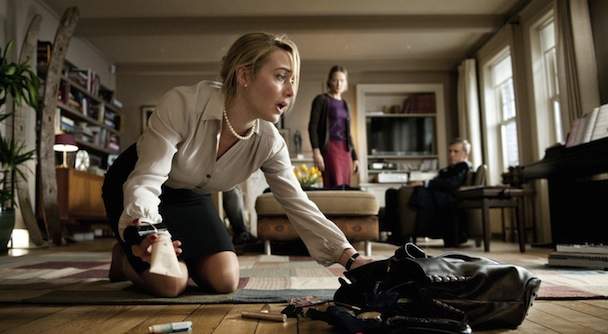Carnage
The new Roman Polanksi film stifles you in an apartment where parents chitchat, bicker and descend into turmoil.
Overview
Carnage is originally a play by Yasmina Reza, now adapted to screen by Roman Polanski. The translation from one format to the other creates a stifling atmosphere; the viewer is trapped in the apartment where the entire movie takes place, and although it is only 80 minutes, it is based far more on dialogue than action, which makes it a little stagnant at times. For any other plot, this could be the film's downfall, but for Carnage, it allows for a spectacularly tense degradation of the veneer we create to tell ourselves (and others) that we are living a fulfilling life.
The film starts with a long shot of kids playing in the park on a sunny day, a seemingly innocent scene until you realise one of them has a stick in his hand and is wielding it dangerously and then hits another kid in the face with it. Immediately after, we see the attempted reconciliation between the parents of Ethan (the victim) and Zach (the wielder of the stick).
Like in the opening scene, it starts innocently enough, with both parties attempting to be courteous and understanding even though they are obviously from different social circles. Penelope (Jodie Foster) and Michael (John C. Reilly) have even bought tulips all the way from The Netherlands for the visit of Nancy (Kate Winslet) and Alan (Christoph Waltz) visit, as if painting a scene of domesticity can create an environment where they can act with graciousness and civility, presenting a united front with their spouse.
What follows is a wonderful piece of orchestral music; violins open as the dialogue waltzes and dances in major keys. As time moves on, double basses creep in as a hint of tension becomes perceptible and builds, until the violins take over again and all is smoothed out. Each crescendo becomes louder and more discordant until the truth painfully is revealed: Alan's lack of care for his son, the frustration Nancy feels about his all-encompassing job, Penelope's despair that no-one actually holds any moral values or cares about societies other than their own and her hurt at Michael's lack of support. As they start to drink malt whisky, the men bond over their misogyny and it becomes a gender battle, with quotes from Ivanhoe and cigars to accentuate the point.
The movie is beautifully orchestrated and has a wonderful, lilting emotional rhythm but I was left feeling empty after it. If it was because it seemed like what the film was trying to say was interrupted mid-speech, leaving us only with half-truths, or because I was depressed about the sentiments shown, I'm not certain. It is definitely worth watching though, as it's bound to spark heated debate and varying opinion.





